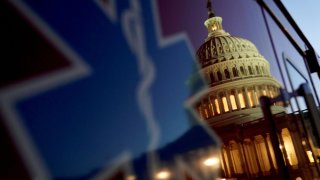
- Washington lawmakers from both sides of the aisle and both chambers announced a new bipartisan coronavirus relief proposal on Monday.
- The deal includes enhanced federal unemployment benefits and other measures, but excludes additional $1,200 stimulus checks.
- Some leaders on Capitol Hill and economists continue to believe those one-time payments are necessary to help fuel a recovery now.
Capitol Hill lawmakers are wrestling with a big question that's plagued them for months: How to put together another coronavirus relief package that will garner enough support from both parties.
On Monday, a new $908 billion bipartisan proposal aims to do just that, except it lacks one key area of aid — second $1,200 stimulus checks.
The CARES Act that was passed by Congress in March authorized the first set of $1,200 checks for individuals and $2,400 for couples, plus $500 per child. In the following months, Washington lawmakers have debated whether a second set of checks is necessary. At times, those payments seemed to be one of the few areas with bipartisan support. Now, however, they are at risk of getting left out completely in favor of other initiatives.
The proposal includes enhanced federal unemployment benefits at $300 per week for 16 weeks, food assistance and student loan forbearance, as well as funding for small businesses, schools and vaccines. A second part would include state and local aid and liability protections.
More from Personal Finance:
Extra unemployment benefits may be delayed, even if Covid bill passes
Most older people will have to wait to get a Covid vaccine
Watch out for this $1,200 stimulus check scam
Money Report
If approved, the aid would come as earlier initiatives that included $1,200 stimulus checks and $600 per week enhanced federal unemployment benefits through the CARES Act, as well as subsequent emergency measures put in place by President Donald Trump, have all expired.
"All of those things are petering out, and that creates an extreme urgency to have another round of stimulus," said Ioana Marinescu, assistant professor of economics at the University of Pennsylvania School of Social Policy and Practice.
Marinescu is a member of a group of more than 125 economists who have urged lawmakers to include additional stimulus checks in the relief legislation.
"Having a broad-based support like a stimulus check would ensure that nobody who needs help would fall through the cracks while at the same time providing stimulus for businesses who would get more customers," Marinescu said.
The exclusion of the stimulus checks is not necessarily final. Last week, Sens. Bernie Sanders, I-Vt., and Josh Hawley, R-Mo., teamed up to come up with an amendment to be attached to upcoming legislation that would include second $1,200 stimulus checks similar to the CARES Act.
On Monday, Sanders continued to call for the additional direct payments to Americans.
"Congress cannot go home for the Christmas holidays until we pass legislation which provides a $1,200 direct payment to working class adults, $2,400 for couples, and a $500 payment to their children," Sanders tweeted.
"This is what Democrats and Republicans did unanimously in March through the CARES Act," he said. "This is what we have to do today."
In an interview with Fox News on Sunday, Trump affirmed that he wants to see additional direct payments to Americans
"Right now, I want to see checks going for more money than they're talking about going to people," Trump said.
President-elect Joe Biden has also said he backs additional direct payments.
Stimulus checks have been criticized because of their high cost — roughly $300 billion — and the fact that they do not necessarily target those who are suffering financially because they are based on past tax returns.
In the end, those payments are targeted, Marinescu said. As people file their 2020 tax returns in the spring, they will receive a credit for the stimulus payments if they were underpaid.
Ultimately, high-income taxpayers will help pay for the cost of the checks because of the way the U.S. tax system is structured, she said.
"I do think that would be great to get a stimulus check," Marinescu said. "But I think the overall need for stimulus of the economy is such that just getting something would be great rather than waiting even longer."
It took the labor market 10 years to recover from the Great Recession, Marinescu noted. The quicker the government provides stimulus aid in this recession, the less time it will take to get out of it, she said.






